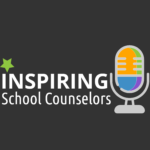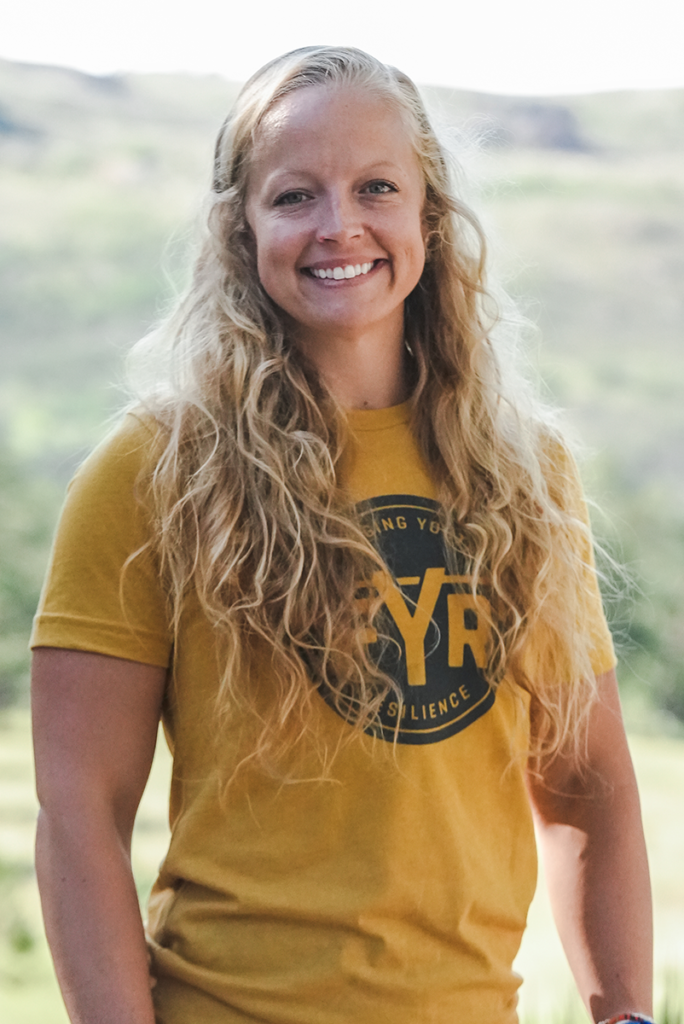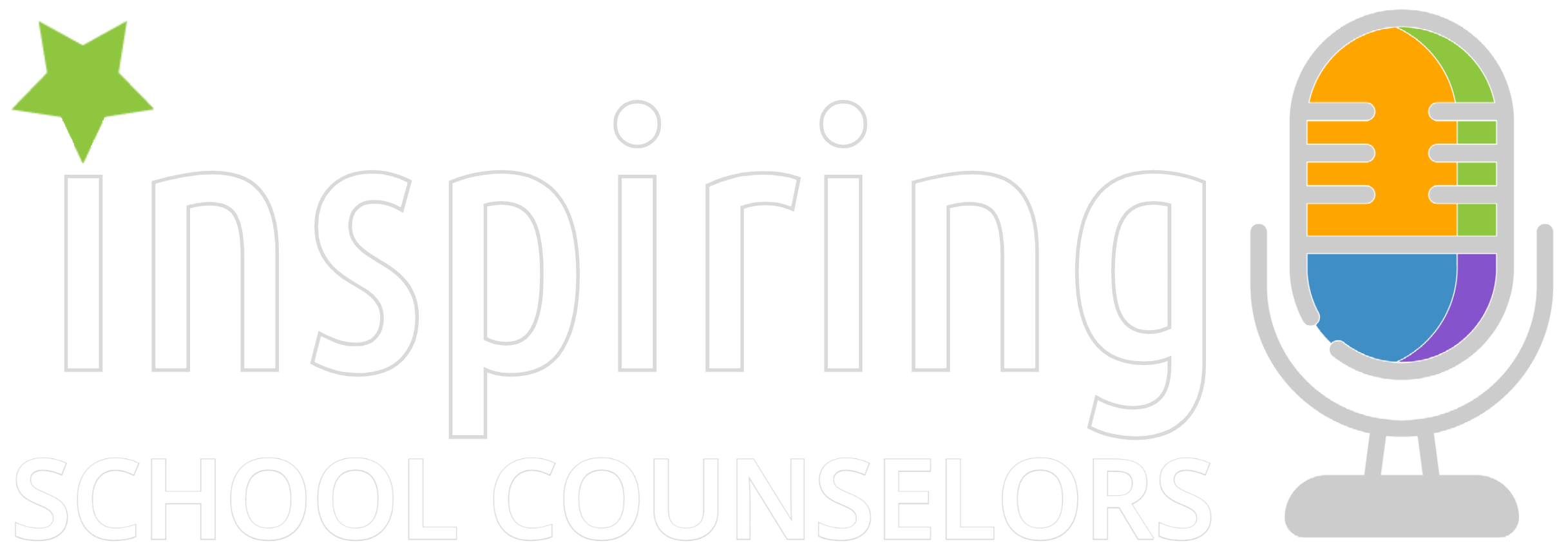Every day when you return home from school, wouldn’t it be great if you were engaged in an activity that you love, keeps you fit, AND continues to benefit students? Michigan School Counselor Kelsey Smith has managed that unique balance, and shares the secret sauce of her success this week with Aimee Portteus.

About Kelsey Smith
Kelsey Smith is in her 12th year as a school counselor, formerly serving nine years at the middle school level but currently serving at the high school level. She is the Local Club Leader and coach for FYR (Forging Youth Resilience) Detroit. Kelsey says she is extremely passionate about empowering youth to become the best versions of themselves.

Resources
Kelsey recommends these resources:
- Malcolm Gladwell’s Books
- Spark: The Revolutionary New Science of Exercise and the Brain by John J. Ratey, MD
We Want to Hear from You!

What’s your best advice for other school counselors? Who has influenced you? What books do you recommend? We want to know! Please take a few minutes to complete the Inspiring School Counselors form.
Subscribe
Inspiring School Counselors is available on these podcast apps and others. If you can’t find the podcast on your favorite app, let us know and we’ll make sure we get there. If you prefer to listen in your browser, visit https://inspiresuccess.org/podcast every week for a new episode. For new episode notifications and more, follow Inspire Success on Facebook, Instagram, or Twitter.
Transcript
A rough transcript follows.
Matt Fleck:
Hi, everyone. Welcome back to the Inspiring School Counselor’s podcast, brought to you as always by Inspire Success and by the generous support of Lilly Endowment. I’m Matt Fleck. Thanks for stopping in to take a listen. It’s hard to believe it’s already November, right? Or for some of you, probably it’s only November. If you are enduring a bit of stress in your role as a school counselor, this podcast is perfect for you. Aimee Portteus interviews Kelsey Smith, a young, fairly new school counselor, even though she’s in her 12th year, who has combined her passion for her vocation with her avocation. The result is something that benefits Kelsey and her students, but might also be inspiring to you. You’ll hear why as Kelsey introduces herself,
Kelsey Smith:
I am a school counselor in, um, Wood Haven, Michigan, which is just south of Detroit. Down river, they would say. <laugh>
Aimee Portteus:
Down river. So you moved from middle school to high school. What, is there anything that surprised you about the difference in school counseling between those two levels?
Kelsey:
I think, you know, some of the, the career development piece, um, it’s just more real at this level. Obviously we talked about it at middle school, but it seems so far away, especially for the students. So, um, to kind of see that in real time, um, you know, has been a little bit of an adjustment or a learning experience and the kids just look like adults <laugh>. It’s just crazy. It’s crazy how much happens just over a few, few short years.
Aimee:
Yes. And then, they’re all of a sudden much taller than you, right?
Kelsey:
Yes, exactly. Exactly.
Aimee:
Okay. I understand that you have incorporated your love for CrossFit into your school counseling strategies. Can you tell us a little bit about that?
Kelsey:
Absolutely. So I’m very much into fitness myself. Um, it’s something I’ve always done. I did sports growing up and you know, once you kinda phase out of that part of your life, you’re like, What do I do now <laugh>? And so I just, it was always something that I did just to, to keep myself healthy, not only physically but mentally. Um, especially working in a field like counseling and school counseling. Um, you know, everybody knows there’s that burnout and all of that kind of thing. So I always tried to make sure that I was keeping myself healthy as well. Um, and it was a couple years ago, I just was like, Why can’t I do this with my students? You know, I don’t know why it had to be separate and it didn’t need to be. So I just, um, started making connections, um, with people in the CrossFit space and realizing like, we can bring these two together.
So I actually started a pilot program, um, in January of 2020. <laugh>. We all know what happened then. Um, but yeah, I started in January, 2020, a pilot program just running a CrossFit based program, um, after school for my students, particularly targeting those at risk or who wouldn’t have access to fitness, cuz unfortunately it is, especially CrossFit, it’s expensive. So I wanted to be able to bring that to students who could really benefit free of charge. Um, and so I started that pilot and then obviously we had the pandemic, so things looked a little different. We had to work through that like everybody else. And so then, um, last year I actually made it official and started a nonprofit called Fire Detroit, um, which stands for Forging Youth Resilience. And so we are an official nonprofit with the state of Michigan. Um, we are a part of a national program called fire. There’s a lot of benefits at the national level as well that I’m able to bring to my students and just learning about the benefits of physical fitness.
Aimee:
Can I interrupt you for a second and just in case we have some people who don’t actually know what CrossFit is, can you kinda explain it?
Kelsey:
Yes, absolutely. So CrossFit is what we would call functional fitness. And so it works on strength training, cardiovascular endurance, as well as gymnastics. Um, but that’s typically anything with your body weight. It’s not like we’re doing back flips, you know, Um, but it incorporates those three components and it allows individuals to be healthy in their normal life and continue to stay healthy as they age. So the goal of CrossFit is not necessarily to lift as much weight as you can or run as fast as you can, but just maintaining overall good physical health, um, so that you can live a fulfilling life.
Aimee:
So then tell me what’s the typical experience of a student who’d be involved in your non-profit?
Kelsey:
Yeah, so we run an hour class twice a week right now after school. And so they come in, um, if they’ve never been there, right? Um, we’ll obviously show them the space, introduce them to other, um, students who are attending the program. Um, and we do the physical component. Um, but we always have a mindset piece at the beginning of class that we then tie in at the end. So we incorporate that mind P mindset piece. Um, cuz we, again, it’s just as important as the physical component. Um, and then we have some sort of a, a wad, we would call it our workout of the day. And so really just putting them through that work. Most of it, it’s, like I said, they’ve not experienced that before, so it’s that like taking on a new challenge but being supported through that. Um, I find sometimes students, especially those at risk aren’t challenged. Like people around them don’t believe that they can do it. And so I do and I wanna give them that opportunity to be faced with a challenge, but be supported through that just to see that transformation when they’re able to either just put themselves out there or overcome that challenge or do something they never thought they could do. Just that, the reward of that and seeing them grow through that.
Aimee:
Can you, do you have a story or two that you can share with us about a particular student or two who was impacted by your programming?
Kelsey:
Yeah, absolutely. Um, there’s one particular student who’s just so inspiring to me. She did start with me when I started the pilot and then obviously through the pandemic. We weren’t meeting at first and we had some changes and she didn’t come back right away, you know, once we kind of got rolling after we worked through all of that, which it happens. And I, you know, try to keep students involved, but sometimes things come up. So we’ve been rolling for a few months now. Um, and she just randomly reached out to me, you know, I’m just not doing well, like my mental health, it’s, it’s rough right now and I just need something. I need to do something. Like, can I come back? Like absolutely. And so she did, she jumped right back in and to see her growth again, the physical growth, but just the mental growth and for her, the leadership, she’s really stepped into a leadership role. Um, she actually was selected this summer to attend the national Forging Youth Resilience summer camp out in Boulder, Colorado to leadership.
Aimee:
Phenomenal.
Kelsey:
Yes. Yes. It was incredible. It was my first experience as a coach to be a part of that and having an athlete attend. Um, and I tell people and they ask like, Oh, how was it? And I’m like, it was life changing. Like I know that sounds dramatic, but literally for myself, for her, just watching the other athletes from across the country come together and just be given opportunities to really see their potential as leaders. One of the things we did at camp was a service project for the location we were staying at, and she was selected to be one of the student leaders to lead the rest of the athletes through the project. And so us as adults were told to be quiet, sit back, <laugh>, you are not leading right. And so just to see her step up to the plate was just incredible. She actually was asked to be a part of the national board, so she applied, um, and now has the opportunity Yeah, absolutely. To represent athletes across the country in terms of fire and continuing to develop the program nationally as well.
Aimee:
That is an amazing story. Thank you for sharing that with us. And I, I’m just so moved by the fact that her bravery to reach out to you in two sentences. Can I come back? You know, has totally impacted her the rest of her life. That’s amazing.
Kelsey:
Yes. Yeah, That’s great. Very excited for her future and just everything she’s already accomplished. It’s incredible.
Aimee:
It is incredible. I guess I’m thinking about, uh, our listeners and if you were, if we were gonna, let’s say we have a school counselor who wants to get started doing something like you’re doing mm-hmm. <affirmative>, how would you recommend that they start? And maybe it’s not CrossFit, maybe it’s inspiration of some other sort of another kind of passion, but how would you recommend that school counselors get started if they wanted to incorporate their personal passions into their work?
Kelsey:
Yeah, absolutely. I think the biggest thing is just networking. Like talking to people, like seeing what they’re doing or what they’ve heard of or what they think would be beneficial. And I think for me, just the realization that they don’t have to be separate. I don’t know why it never clicked for me, but just thinking about what are you passionate about and how can you bring that to your students? And then just reaching out, you know, just relying on people around you, bouncing ideas off and using students, you know, I’ve learned like through this, you know, I can’t do it on my own. And they have so much to give so many good ideas. So relying on them as well. Well, I mean they, they got a lot to offer.
Aimee:
Yeah. And, building that ownership probably does really impact your process, right?
Kelsey:
Yes, absolutely.
Aimee:
Especially keeping it going and having other students who wanna join in. I love that. I love that.
So, uh, Kelsey, you are very inspirational, but I am sure that there are days just like the rest of us, that maybe you don’t feel quite as motivated. So how do you find your drive again on days when you just don’t feel like it?
Kelsey:
Yeah, you know, that definitely is an unfortunate reality, you know, that we all experience that’s life. Um, so I think just recognizing when you need something, you know, I think sometimes, especially as school counselors, I mean it’s go, go, go, go, go <laugh>, right? There’s no time to stop and think, “What do I need?” Um, so making sure you’re giving yourself time to do that and reflect. Sometimes I think what we need is uncomfortable and so being okay with change, um, or making steps towards change, even though it might be scary or unknown. But making this transition this year to the high school was, I mean I was the last building for nine years. A lot of my colleagues, my co-counselor I worked with for a long time, you know, and I loved it. But there’s an opportunity and I don’t know, I felt like I need to take a risk. I need to make a change and see what happens. My goal is to just impact students, you know, as best I can. Um, and if I’m feeling stuck or unmotivated, like I can’t do that. So figuring out what is it I need and being able, taking steps towards that as well as not being afraid of the change. It’s hard for counselors, <laugh>.
Aimee:
It is. We’re always thinking about everybody else, you know? But isn’t that amazing because we teach people to name their needs and their feelings and <laugh>, we don’t do it ourselves. <laugh>,
Kelsey:
Yes, <laugh>.
Aimee:
It’s hard to make us, make ourselves sit down long enough to do that.
Well, you’ve given up, given us a lot to think about today and that’s just awesome.
You said that you, that you have learned to extend grace to yourself and those around you. Tell me a little bit about what that looks like to you.
Kelsey:
Oh boy, that’s hard. <laugh>. Yeah, I mean I think we just give so much of ourselves and we just expect that we can do that. Um, so just giving ourselves the opportunity, like we talked about, to check in, do what we need to do to fill ourselves up. Because, I mean, we know, right? Like logically we know we can’t help others if we’re not in a good place, you know? And so I think for me, um, just knowing when I haven’t done that and I’m not giving my best to students, like giving myself some grace there, like I’m human too, but recognizing I need to do better moving forward. I think we can be too hard on ourselves.
Aimee:
Yeah, I like that. I had a colleague tell me one time, you should be as kind to yourself as you are to everybody else.
Kelsey:
Yeah. Right? Like, yeah, yeah, I know. But <laugh>,
Aimee:
So is there anything that we’ve missed that you wanna talk about?
Kelsey:
Um, I don’t think so. I appreciate you having me on. Definitely. Uh, I could talk forever <laugh>, you know, about this, but, um, That’s awesome. I just, yeah. I hope I can inspire someone to just bring in something unique that they’re passionate about and just use that to benefit their students.
Aimee:
Oh, absolutely. You’ve totally inspired me. I’m, as soon as I turn this off, I’m gonna go for a run.
Kelsey:
<laugh> Awesome. <laugh>.
Aimee:
That’s probably not true, but I like to think that I would be.
Kelsey:
Yeah, right.
Matt:
Hey, thanks to Kelsey and Aimee and a reminder you can see a picture of Kelsey and find links to the two resources she recommends for other school counselors on our podcast website, inspiresuccess.org/podcast.
And before we go, I know it’s a bit to ask, but could you take a minute this week to rate and review us on whatever podcast app you listen to us on? We would appreciate it. And so would our generous sponsor who likes to know that you would like to continue hearing podcasts like this. Thank you for that. And thanks for all you do as a counselor. We’ll be back again soon. Hope you join us next time.
